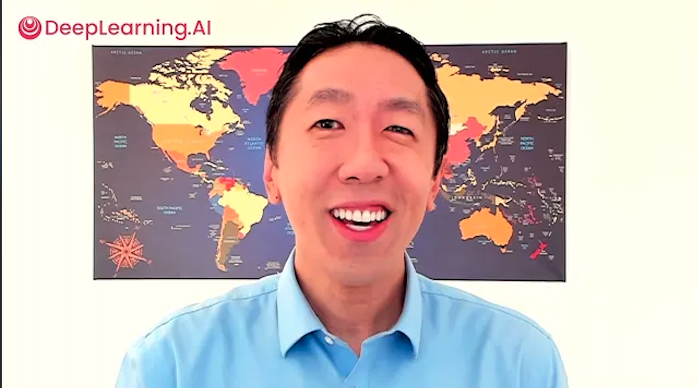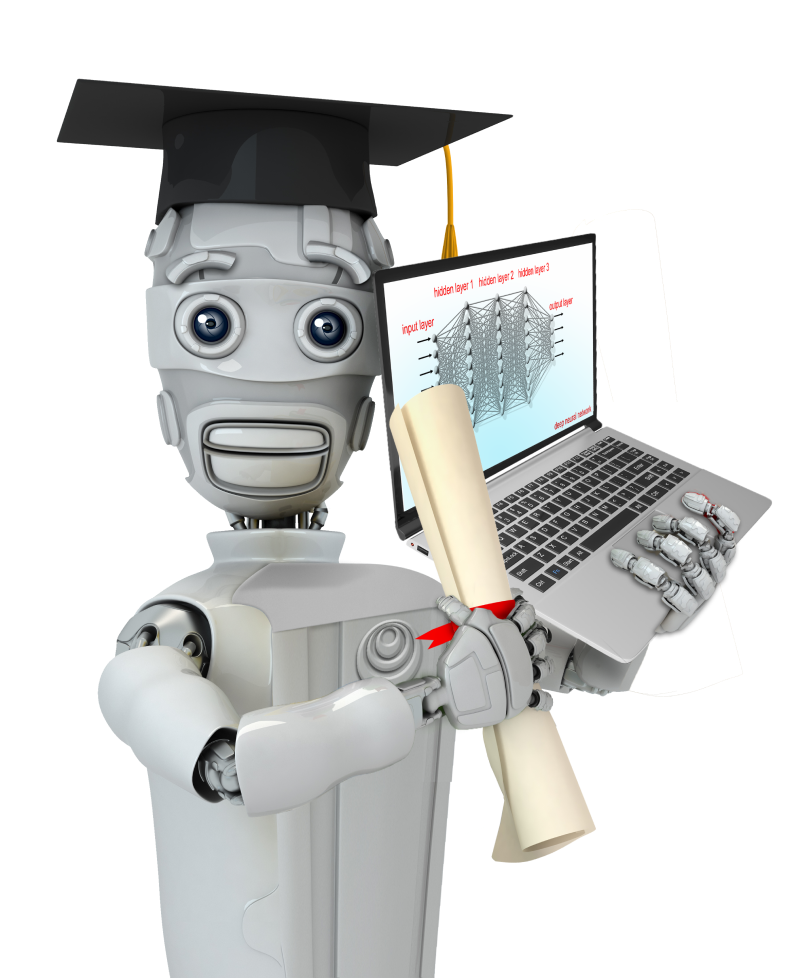
“As a Behavioral Scientist, I was able to adopt methods to understand my customers better, overcome the traditional ‘one-size-fits-all’ approach, and design interventions which account for personality and individual differences.”



#BreakIntoAI with the new Machine Learning Specialization, an updated foundational program for beginners created by Andrew Ng.



A pioneer in the AI industry, Andrew Ng co-founded Google Brain and Coursera, led AI research at Baidu, and has reached and impacted millions of learners with his machine learning courses.
Newly rebuilt and expanded into 3 courses, the updated Specialization teaches foundational AI concepts through an intuitive visual approach, before introducing the code needed to implement the algorithms and the underlying math.

“As a Behavioral Scientist, I was able to adopt methods to understand my customers better, overcome the traditional ‘one-size-fits-all’ approach, and design interventions which account for personality and individual differences.”

“I gained confidence in my knowledge of machine learning. Since then, I’ve become a machine learning mentor, got a research paper published in IEEE, decided to pursue my Masters in Machine Learning, and was able to land a job at JP Morgan Chase.”

“The Machine Learning course became a guiding light. Andrew Ng explains concepts with simple visualizations and plots. I learned how to evaluate my training results and explain the outcomes to my colleagues, boss, and even the vice president of our company.”

“The Machine Learning course helped develop my problem-solving skills, inspired an attitude of experimentation, and shaped a passion for machine learning. Since then, I have automated several investment processes and experimented with investment data.”

“The Machine Learning course by Andrew Ng expanded my knowledge, so I could write a research paper on Facial Emotion Recognition and land an internship at Morgan Stanley.”

“In 2017, the Machine Learning course helped me gain a deep insight into Natural Language Processing and got me thinking about a new ML project with a friend. We built an ML app with a cloud instance to enhance recorded autobiographies with NLP-generated insights!”

“I’m a Computational Scientist with a Ph. D. in theoretical nuclear phsyics. I was working on a research project that involved archeological datasets that eventually led to a publication. The foundations of machine learning from Andrew's class were essential in making it happen.”

“Andrew’s teaching style helped me grasp foundational concepts. The newly acquired knowledge from the Machine Learning course helped me land a second postdoctoral position, run tutorials for two data science courses, and write my first machine learning paper!”

“Enrolling in the Machine Learning course was the most consequential decision I’ve ever made. When I was facing unemployment, I turned things around by combining deep learning and Wall Street data to materialize my start-up dream!”




Created in collaboration with Stanford Online
In the first course of the Machine Learning Specialization, you will:
In the second course of the Machine Learning Specialization, you will:
In the third course of the Machine Learning Specialization, you will:
Machine learning is a branch of artificial intelligence that enables algorithms to automatically learn from data without being explicitly programmed. Its practitioners train algorithms to identify patterns in data and to make decisions with minimal human intervention.
In the past two decades, machine learning has gone from a niche academic interest to a central part of the tech industry. It has given us self-driving cars, speech and image recognition, effective web search, fraud detection, a vastly improved understanding of the human genome, and many other advances. Amid this explosion of applications, there is a shortage of qualified data scientists, analysts, and machine learning engineers, making them some of the world’s most in-demand professionals.
The Machine Learning Specialization is a foundational online program created in collaboration between DeepLearning.AI and Stanford Online. This beginner-friendly program will teach you the fundamentals of machine learning and how to use these techniques to build real-world AI applications.
This Specialization is taught by Andrew Ng, an AI pioneer who has led critical research at Stanford University and groundbreaking work at Google Brain, Baidu, and Landing.AI to advance the AI field.
This 3-course Specialization is an updated and expanded version of Andrew’s pioneering Machine Learning course, rated 4.9 out of 5 and taken by over 4.8 million learners since it launched in 2012.
It provides a broad introduction to modern machine learning, including supervised learning (multiple linear regression, logistic regression, neural networks, and decision trees), unsupervised learning (clustering, dimensionality reduction, recommender systems), and some of the best practices used in Silicon Valley for artificial intelligence and machine learning innovation (evaluating and tuning models, taking a data-centric approach to improving performance, and more.)
By the end of this Specialization, you will have mastered key concepts and gained the practical know-how to quickly and powerfully apply machine learning to challenging real-world problems. If you’re looking to break into AI or build a career in machine learning, the new Machine Learning Specialization is the best place to start.
By the end of this Specialization, you will be ready to
Learners should understand basic coding (for loops, functions, if/else statements) and high school-level math (arithmetic, algebra). Any additional math concepts will be explained along the way.
The Machine Learning Specialization is a beginner-level program aimed at those new to AI and looking to gain a foundational understanding of how machine learning models work and real-world experience building systems using Python.
This Specialization is suitable for learners with some basic knowledge of programming and high-school level math, as well as early-stage professionals in software engineering and data analysis who wish to upskill in machine learning.
This Specialization consists of three courses. At the rate of 5 hours per week, it will take you 3 weeks to complete Course 1, 4 weeks to complete Course 2, and 3 weeks to complete Course 3 of the Machine Learning Specialization.
This Specialization was created by Andrew Ng, Eddy Shyu, Aarti Bagul, and Geoff Ladwig.
Andrew Ng is the Founder of DeepLearning.AI, Founder and CEO of Landing AI, Chairman and Co-founder of Coursera, and an Adjunct Professor at Stanford University. Dr. Ng has changed countless lives through his work, authoring or co-authoring over 200 research papers in machine learning, robotics, and related fields. He was the founding lead of the Google Brain team and Chief Scientist at Baidu, and through this work built the teams that led the AI transformation of two leading internet companies. He is the co-founder and Chairman of Coursera — the world's largest online learning platform — which had started with his machine learning course. Dr. Ng now focuses primarily on his entrepreneurial ventures, looking for the best ways to accelerate responsible AI practices in the larger global economy.
Eddy Shyu is a product lead at DeepLearning.AI and has led the teams that built the Machine Learning Specialization (featuring Andrew Ng), TensorFlow Advanced Techniques (featuring Laurence Moroney), as well as the Natural Language Processing Specialization, and AI for Medicine Specialization. Eddy was also co-instructor for Udacity's AI for Trading Nanodegree program.
Aarti Bagul is a machine learning engineer at Snorkel AI. Before Snorkel, she worked closely with Andrew Ng in various capacities: At the AI Fund, she helped build and invest in machine learning companies. Previously, she was a machine learning engineer at Landing AI and was the head teacher’s assistant for Dr. Ng’s deep learning class at Stanford University. She graduated with a Master's in Computer Science from Stanford and a Bachelor's in Computer Science and Computer Engineering from NYU with the highest honors.
Geoff Ladwig started as a Deep Learning student and a mentor for the Deep Learning Specialization. He worked as a consultant on the Natural Language Processing Specialization and as a Curriculum Engineer on the Machine Learning Specialization. Geoff has spent most of his career as an ASIC/Hardware/System engineer/architect in the communications and computer industries.
The Machine Learning Specialization is a foundational online program taught by Andrew Ng, an AI pioneer who has led critical research at Stanford University and groundbreaking work at Google Brain, Baidu, and Landing.AI to advance the AI field.
This 3-course Specialization is an updated and expanded version of Andrew’s pioneering Machine Learning course, rated 4.9 out of 5 and taken by over 4.8 million learners since it launched in 2012.
This program has been designed to teach you foundational machine learning concepts without prior math knowledge or a rigorous coding background. Unlike the original course, which required some knowledge of math, the new Specialization aptly balances intuition, code practice, and mathematical theory to create a simple and effective learning experience for first-time students.
Each lesson begins with a visual representation of machine learning concepts and a high-level explanation of the intuition behind them. It then provides the code to help you implement these algorithms and additional videos explaining the underlying math if you wish to dive deeper. These lessons are optional and are not required to complete the Specialization or apply machine learning to real-world projects.
If you’re looking to break into AI or build a career in machine learning, the new Machine Learning Specialization is the best place to start.
The new Machine Learning Specialization includes an expanded list of topics that focus on the most crucial machine learning concepts (such as decision trees) and tools (such as TensorFlow).
Unlike the original course, the new Specialization is designed to teach foundational ML concepts without prior math knowledge or a rigorous coding background. It aptly balances intuition, code practice, and mathematical theory to create a simple and effective learning experience for first-time students.
Each lesson begins with a visual representation of machine learning concepts and a high-level explanation of the intuition behind them. It then provides the code to help you implement these algorithms and additional videos explaining the underlying math if you wish to dive deeper. These lessons are optional and are not required to complete the Specialization or apply machine learning to real-world projects.
In the decade since the first Machine Learning course debuted, Python has become the primary programming language for AI applications. The assignments and lectures in the new Specialization have been rebuilt to use Python rather than Octave, like in the original course.
Before the graded programming assignments, there are additional ungraded code notebooks with sample code and interactive graphs to help you visualize what an algorithm is doing and make it easier to complete programming exercises.
The section on practical advice on applying machine learning has been updated significantly based on emerging best practices from the last decade.
The new Machine Learning Specialization is the best entry point for beginners looking to break into the AI field or kick start their machine learning careers. This updated Specialization takes the core curriculum — which has been vetted by millions of learners over the years — and makes it more approachable for beginners.
Unlike the original course, the new Specialization is designed to teach foundational ML concepts without prior math knowledge or a rigorous coding background. It aptly balances intuition, code practice, and mathematical theory to create a simple and effective learning experience for first-time students.
Each lesson begins with a visual representation of machine learning concepts and a high-level explanation of the intuition behind them. It then provides the code to help you implement these algorithms and additional videos explaining the underlying math if you wish to dive deeper. These lessons are optional and are not required to complete the Specialization or apply machine learning to real-world projects.
The new Machine Learning Specialization includes an expanded list of topics that focus on the most crucial machine learning concepts (such as decision trees) and tools (such as TensorFlow).
In the decade since the first Machine Learning course debuted, Python has become the primary programming language for AI applications. The assignments and lectures in the new Specialization have been rebuilt to use Python rather than Octave, like in the original course.
Before the graded programming assignments, there are additional ungraded code notebooks with sample code and interactive graphs to help you visualize what an algorithm is doing and make it easier to complete programming exercises.
The section on practical advice on applying machine learning has been updated significantly based on emerging best practices from the last decade.
If you enrolled in but didn’t complete the original course because you may have been discouraged by the math requirements or didn’t know if you would be able to keep up with the lessons, then the new Machine Learning Specialization is for you. This updated Specialization takes the core curriculum — which has been vetted by millions of learners over the years — and makes it more approachable for beginners.
Unlike the original course, the new Specialization is designed to teach foundational ML concepts without prior math knowledge or a rigorous coding background. It aptly balances intuition, code practice, and mathematical theory to create a simple and effective learning experience for first-time students.
Each lesson begins with a visual representation of machine learning concepts and a high-level explanation of the intuition behind them. It then provides the code to help you implement these algorithms and additional videos explaining the underlying math if you wish to dive deeper. These lessons are optional and are not required to complete the Specialization or apply machine learning to real-world projects.
The new Machine Learning Specialization includes an expanded list of topics that focus on the most crucial machine learning concepts (such as decision trees) and tools (such as TensorFlow).
In the decade since the first Machine Learning course debuted, Python has become the primary programming language for AI applications. The assignments and lectures in the new Specialization have been rebuilt to use Python rather than Octave, like in the original course.
Before the graded programming assignments, there are additional ungraded code notebooks with sample code and interactive graphs to help you visualize what an algorithm is doing and make it easier to complete programming exercises.
The section on practical advice on applying machine learning has been updated significantly based on emerging best practices from the last decade.
Congratulations on completing the original Machine Learning course! This new Specialization is an excellent way to refresh the foundational concepts you have learned.
The new Machine Learning Specialization includes an expanded list of topics that focus on the most crucial machine learning concepts (such as decision trees) and tools (such as TensorFlow).
In the decade since the first Machine Learning course debuted, Python has become the primary programming language for AI applications. The assignments and lectures in the new Specialization have been rebuilt to use Python rather than Octave, like in the original course.
Before the graded programming assignments, there are additional ungraded code notebooks with sample code and interactive graphs to help you visualize what an algorithm is doing and make it easier to complete programming exercises.
The section on practical advice on applying machine learning has been updated significantly based on emerging best practices from the last decade.
Congratulations on completing the Deep Learning Specialization! Compared to the more advanced Deep Learning Specialization, the new Machine Learning Specialization covers topics such as unsupervised learning, recommender systems, tree-based models, and other commonly used traditional machine learning algorithms not based on neural networks.
If you are already a working AI professional, refreshing your knowledge base and learning about these latest techniques will help you advance your career.
The Machine Learning Specialization is made up of 3 courses.
You can enroll in the Machine Learning Specialization on Coursera. You will watch videos and complete assignments on Coursera as well.
We recommend taking the courses in the prescribed order for a logical and thorough learning experience.
A Coursera subscription costs $49 / month.
Yes, Coursera provides financial aid to learners who cannot afford the fee.
You can audit the courses in the Machine Learning Specialization for free.
Note that you will not receive a certificate at the end of the course if you choose to audit it for free instead of purchasing it.
Visit coursera.org/business for more information, to pick up a plan, and to contact Coursera. For each plan, you decide the number of courses every member can enroll in and the collection of courses they can choose from.
No.
You will receive a certificate at the end of each course if you pay for the courses and complete the programming assignments. There is a limit of 180 days of certificate eligibility, after which you must re-purchase the course to obtain a certificate. If you audit the course for free, you will not receive a certificate.
If you complete all 4 courses and are subscribed to the Specialization, you will also receive an additional certificate showing that you completed the entire Specialization.